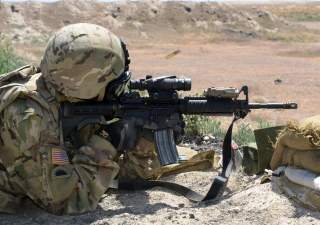Explained: Why Does America Still Have Troops in Iraq?
Aren't they suppose to have left? We explain what is going on.
The Iraqi Parliament has followed through on their promise to vote for the expulsion of U.S. troops from Iraqi soil following a U.S. drone strike against top Iranian general Qasem Soleimani, putting the spotlight back on the Trump administration’s plans to maintain a continued Middle-Eastern military presence amid the uncertainty of the post-Soleimani world.
Defense Secretary Mark Esper has spent the past several days addressing the confusion around an unsigned Pentagon letter alleging the imminent withdrawal of U.S. troops stationed in Iraq, insisting in a recent CNN interview that the U.S. military has no intention of leaving Iraq: “...the United States is not withdrawing from Iraq. In fact, in my conversations with my counterpart, the Iraqi defense minister, I conveyed to him that we do want to stay in Iraq and we want to continue the important defeat ISIS mission.”
But just how extensive is the U.S. military presence in Iraq, and what’s at stake in the debate over a prospective US withdrawal from that country?
There are just over 5,000 U.S. troops on Iraqi territory, spread across 12 military installations within the Iraqi state and Iraqi Kurdistan. Since the end of Operation Iraqi Freedom-- and with it, the active stage of the Iraq War-- in 2010-2011, U.S. armed forces have gradually shifted their mission in Iraq from proactive, large-scale counterinsurgency operations to a training/advising role. Following the regional chaos of the Syrian Civil War and the rise of ISIS around 2014, the Pentagon repurposed its Iraq-based assets for an airpower role in precision strikes against ISIS targets in Syria and neighboring states. The U.S. army’s Iraqi garrisons attained a newfound importance in 2017, when then-Defense Secretary Jim Mattis coordinated US air support with a Kursish-Turkish-French coalition force to encircle and capture the ISIS stronghold of Mosul in Northern Iraq.
In the present day, the regional influence of ISIS has been greatly diminished following a series of crippling defeats in the latter stages of the Syrian Civil War. Still, a great swathe of the Washington political establishment sees a full withdrawal from Iraq as an “invitation” for ISIS or an ISIS-like successor group to reemerge; the Iraqi army, they argue, is ill-equipped to handle the looming fundamentalist threat on its own. Likewise, foreign policy hawks worry that a U.S. withdrawal would leave Iraq to be absorbed into the Iranian sphere of influence; as the Atlantic Council puts it, withdrawal gives “Soleimani the kind of posthumous victory the Trump administration previously denied him when he was alive.”
But the ongoing military presence and state-building project in Iraq has cost the U.S. trillions in taxpayer dollars and just south of 5,000 military deaths, with little to show by way of geopolitical dividends. The Iraqi government’s continued insistence on a full U.S. withdrawal may serve as the impetus for new solutions to Washington's military quagmire in the Middle East. Military experts, notably including former Lieutenant Colonel and senior fellow for Defense Priorities Daniel L. Davis, have argued that U.S. global strike capabilities are so sophisticated that an effective counter-terrorism doctrine no longer requires garrisons in the Middle East. Likewise, defense commentators continue to highlight the utility of intelligence operations and limited precision airstrikes by Special Operations Forces (SOF) units as cheaper, more effective methods of force projection than maintaining permanent military bases.
The ongoing debate over a prospective US withdrawal from Iraq comes amid a renewed sense of regional instability in the aftermath of the Soleimani killing, setting the stage for what may lead to a major restructuring of US military priorities in the Middle East-- including the Trump administration’s ambiguous Iran strategy-- more broadly.
Mark Episkopos is a frequent contributor to The National Interest and serves as a research assistant at the Center for the National Interest. Mark is also a PhD student in History at American University.

